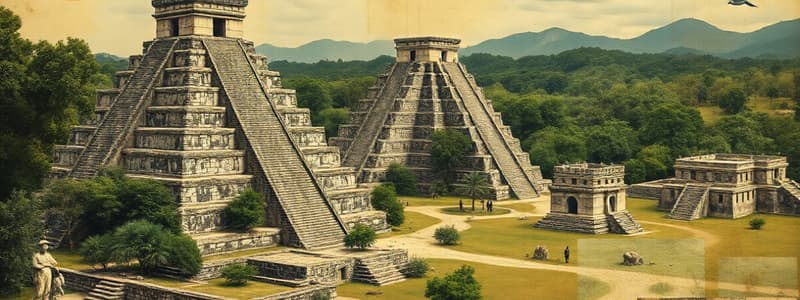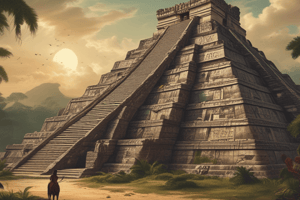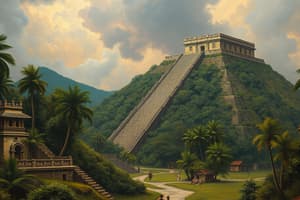Podcast
Questions and Answers
What architectural style emphasizes dynamic forms and is rooted in the early 20th century context of speed and technology?
What architectural style emphasizes dynamic forms and is rooted in the early 20th century context of speed and technology?
- Modernism
- Brutalism
- Futurism (correct)
- Post Modernism
Which architectural style, prominent in the late 20th century, is characterized by complex facades with overlapping elements?
Which architectural style, prominent in the late 20th century, is characterized by complex facades with overlapping elements?
- Brutalism
- Deconstructivism (correct)
- Post Modernism
- Modernism
Which style is focused on eco-friendly designs and techniques such as green roofs and solar panels?
Which style is focused on eco-friendly designs and techniques such as green roofs and solar panels?
- Brutalism
- Organic Architecture
- Green Architecture (correct)
- Modernism
Which architectural style is known for its emphasis on raw concrete and an austere aesthetic?
Which architectural style is known for its emphasis on raw concrete and an austere aesthetic?
Which style often includes fragmented forms and challenges traditional architectural conventions?
Which style often includes fragmented forms and challenges traditional architectural conventions?
What is a common characteristic of Modernism in architecture?
What is a common characteristic of Modernism in architecture?
Which architectural movement emerged as a critique of modernism and included a mix of historical styles?
Which architectural movement emerged as a critique of modernism and included a mix of historical styles?
Which architectural style is generally characterized by structures that harmonize with nature, using features like solar panels?
Which architectural style is generally characterized by structures that harmonize with nature, using features like solar panels?
Which architectural style became dominant after World War II until it was replaced by postmodernism in the 1980s?
Which architectural style became dominant after World War II until it was replaced by postmodernism in the 1980s?
What architectural style is characterized by its aim to create a harmonious relationship between a building and its natural surroundings?
What architectural style is characterized by its aim to create a harmonious relationship between a building and its natural surroundings?
Which style is often associated with the use of raw concrete and a focus on large, block-like structures?
Which style is often associated with the use of raw concrete and a focus on large, block-like structures?
Which architectural philosophy emerged in the late 20th century as a response to the strict minimalism of Modernism?
Which architectural philosophy emerged in the late 20th century as a response to the strict minimalism of Modernism?
What approach in architecture prioritizes adaptability and sustainability in urban planning and emerged in Japan in the 1960s?
What approach in architecture prioritizes adaptability and sustainability in urban planning and emerged in Japan in the 1960s?
Which architectural style rejects ornamentation and is based on the principles of functionalism and minimalism?
Which architectural style rejects ornamentation and is based on the principles of functionalism and minimalism?
In which architectural movement is the use of technology combined with craft considered essential for design unity?
In which architectural movement is the use of technology combined with craft considered essential for design unity?
Which style is known for its eclectic characteristics and a focus on vibrant colors and bold geometric patterns?
Which style is known for its eclectic characteristics and a focus on vibrant colors and bold geometric patterns?
Which architectural movement emphasizes social equity and community-focused designs?
Which architectural movement emphasizes social equity and community-focused designs?
What feature is commonly associated with Brutalist architecture?
What feature is commonly associated with Brutalist architecture?
What characteristic is typically associated with Modernism in architecture?
What characteristic is typically associated with Modernism in architecture?
Which movement is known for its reaction against the ideals of Modernism, incorporating irony and historical references?
Which movement is known for its reaction against the ideals of Modernism, incorporating irony and historical references?
In which architectural style is the aim of reducing environmental impact prioritized through the use of sustainable materials?
In which architectural style is the aim of reducing environmental impact prioritized through the use of sustainable materials?
Which architectural approach focuses on dynamic and futuristic structures, often utilizing new technologies?
Which architectural approach focuses on dynamic and futuristic structures, often utilizing new technologies?
Which feature is emphasized in Post Modern architecture that distinguishes it from Modernism?
Which feature is emphasized in Post Modern architecture that distinguishes it from Modernism?
What is a key characteristic of Futurist architecture?
What is a key characteristic of Futurist architecture?
Flashcards
Deconstructivism architecture
Deconstructivism architecture
An architectural style of the late 20th century characterized by complex, fragmented, and often seemingly chaotic facades.
Modernism architecture
Modernism architecture
An early 20th-century architectural style embracing speed, technology, and modernity. It rejected classical styles and emphasized dynamic forms.
Green Architecture
Green Architecture
An architectural style emphasizing sustainable practices, using green roofs, solar panels, rainwater harvesting, etc., promoting harmony with nature.
Dancing House
Dancing House
Signup and view all the flashcards
Bosco Verticale
Bosco Verticale
Signup and view all the flashcards
Technological integration in contemporary architecture
Technological integration in contemporary architecture
Signup and view all the flashcards
Global trend in contemporary architecture
Global trend in contemporary architecture
Signup and view all the flashcards
Guggenheim Museum Bilbao
Guggenheim Museum Bilbao
Signup and view all the flashcards
Tikal Temple
Tikal Temple
Signup and view all the flashcards
Machu Picchu
Machu Picchu
Signup and view all the flashcards
Inca Trail
Inca Trail
Signup and view all the flashcards
Intihuatana Stone
Intihuatana Stone
Signup and view all the flashcards
Temple of Three Windows
Temple of Three Windows
Signup and view all the flashcards
Quipu
Quipu
Signup and view all the flashcards
Neo-Renaissance
Neo-Renaissance
Signup and view all the flashcards
Revivalism Architecture
Revivalism Architecture
Signup and view all the flashcards
Arts and Crafts Movement
Arts and Crafts Movement
Signup and view all the flashcards
Biomorphic Architecture
Biomorphic Architecture
Signup and view all the flashcards
Metabolism (Architecture)
Metabolism (Architecture)
Signup and view all the flashcards
Art Deco
Art Deco
Signup and view all the flashcards
Modernist Architecture Colors
Modernist Architecture Colors
Signup and view all the flashcards
Bauhaus
Bauhaus
Signup and view all the flashcards
International Style
International Style
Signup and view all the flashcards
Study Notes
Group 1
- Mesoamerica is the "Middle of America", located in the southern portion of North America, encompassing the Isthmus of Panama.
- The Pyramid of the Sun is one of the largest structures in the Western Hemisphere, located in Teotihuacán, Mexico.
- Mesoamerica's Formative period is divided into three periods: Early, Middle, and Late.
- The Classic Period is the peak of the Maya civilization, noted for writing, calendar systems, polychrome ceramics, and more.
- Chichén Itzá is a Mayan city on the Yucatan Peninsula, an archaeological site and tourist destination.
- The Mayan civilization of the Western Hemisphere was prominent for agriculture, monumental architecture (stone buildings and pyramids), metalworking, and hieroglyphic writing.
- The Long Count is a calendar system based on multiples of a 360-day year, originating in 3114 BC.
- The Pyramid of the Moon is the second largest structure in Teotihuacán, standing at 140 feet tall and measuring 426 by 511 feet at the base.
- The Avenue of the Dead is a 2-kilometer-long and 40-meter-wide archaeological site at Teotihuacan, connecting the Pyramid of the Moon and Sun.
- The Temple of Kukulcán is a Mayan architectural masterpiece from the Itza-Cocom culture, a four-sided pyramid with a rectangular temple on top.
Group 2
- Chinampas are floating gardens developed by the Aztecs.
- Codex Borbonicus is an Aztec manuscript detailing religious practices and the calendar system.
- Tenochtitlan was the capital city of the Aztec Empire, located on an island in Lake Texcoco.
- Templo Mayor was a temple in Tenochtitlan dedicated to Huitzilopochtli (god of war) and Tlaloc (god of rain and agriculture).
- Tikal Temple is a Mayan structure influencing Aztec temple design, known for height and ceremonial importance.
- Machu Picchu is an Inca mountain estate demonstrating Inca architectural sophistication and sustainable agriculture.
- The Inca Trail is a network of roads built by the Inca Empire, a connecting pathway for travel and commerce.
- Intihuatana is a stone at Machu Picchu used for astronomical observation and precise solar alignment.
- The Temple of the Three Windows in Inca cosmology represents the underworld, earth and heavens.
- Quipu is an Inca record-keeping system using knotted cords to manage information.
Group 3
- Neo-Renaissance is another term for Renaissance Revival architecture.
- Renaissance Revival architecture was primarily inspired by the 15th-16th centuries.
- Revival architecture uses architectural style from previous eras but uses it again in a new context.
- Basilica plans are frequently found in Romanesque Revival architecture.
- The Arc de Triomphe in Paris honors those who fought and died for France in a Neoclassical architectural style.
- Thomas Jefferson designed Monticello and the Rotunda at the University of Virginia.
- Gothic Revival architecture emphasizes verticality, intricate detailing, and pointed arches.
- Gothic Revival architecture is evident in the pointed arches and ribbed vaults within windows and doorways.
Group 4
- Decorative rings and ogees are decorative features of the Iron Bridge.
- Pont des Arts bridge in Paris has seven steel arches.
- James Watt revolutionized the steam engine during the Industrial Revolution.
- Elisha Otis invented the safety elevator, revolutionizing urban architecture and modern skyscrapers.
Group 5
- Art Nouveau is a style that breaks away from historical styles using innovation in materials and design.
- Arts and Crafts Movement embraces handcrafted details, natural materials, and simple, functional design as a reaction to industrial mass production..
- Biomorphic Architecture is characterized by flowing shapes resembling natural forms.
- Modernism is a dominant architectural style after World War II until replaced by postmodernism.
- Metabolism is a Japanese architectural philosophy focusing on flexibility, adaptability, and sustainability in urban planning focusing on rapid urbanization.
- Art Deco is characterized by bold geometric patterns, vibrant colors, and luxurious materials like chrome and glass.
- Modernist architecture often uses light colors for minimalist design.
- The Bauhaus school advocated for the integration of art, craft, and technology.
- Glass is a defining material in modernist architecture, enabling expansive windows and curtain walls emphasizing transparency and light.
Group 6
- Modernism is a major architectural style that began in Western Europe in the 1920s and dominated until the 1970s.
- Postmodernism is a reaction to the strict minimalism of Modernism in the late 20th century.
- International Style architecture features functionalism, minimalism, and rejection of ornamentation.
- Brutalism is characterized by its quick construction and economical nature.
- Organic Architecture seeks a harmonious relationship between a building and its natural surroundings.
- Deconstructivism is an architectural style with complex facades and overlapping/intersecting elements.
- Futurism is an architectural style focusing on speed, technology, and modernity, breaking from classical forms.
- Green Architecture uses environmentally friendly features for harmonious coexistence with natural ecosystems.
Group 7
- Solar panels are a technological integration to improve building efficiency.
- Buildings are designed to withstand extreme weather events as a global trend to combat climate change.
- The Guggenheim Museum in Bilbao, Spain, is notable for its curvaceous titanium exterior inspired by organic forms.
- Zaha Hadid is a prominent female architect.
- Contemporary architecture often integrates adaptive reuse.
- Modernism is a style that has greatly impacted contemporary architecture.
- Neoclassicism is a style that emphasizes speed, technology, and modernity.
Studying That Suits You
Use AI to generate personalized quizzes and flashcards to suit your learning preferences.




